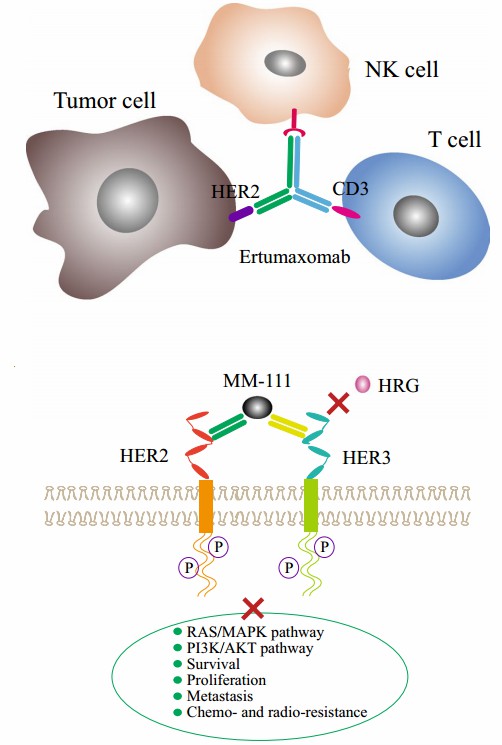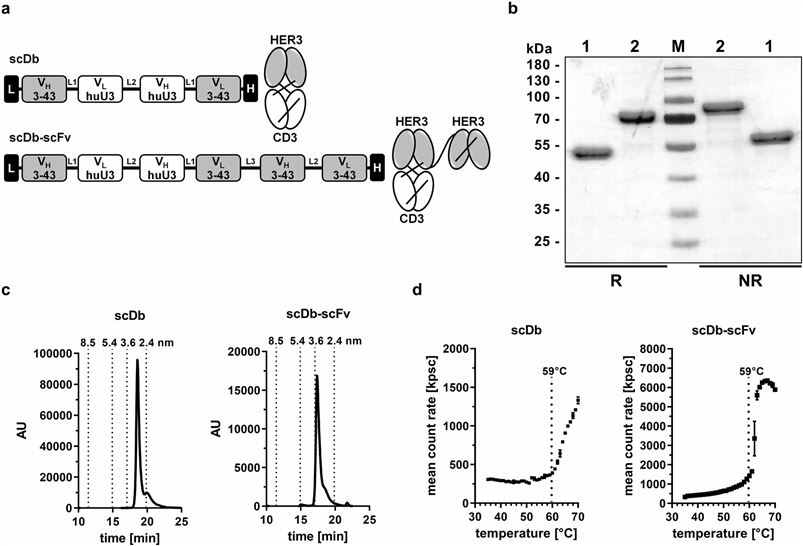BsAbs and Cancer Published Data Our Services
As a leading expert in the field of antibody research, Creative Biolabs is delighted to introduce our comprehensive range of cutting-edge bispecific antibody (BsAb) products and related services. Leveraging our state-of-the-art BsAb antibody development platform, we are dedicated to providing you with tailored services encompassing BsAb design, manufacture, analysis, engineering, and purification.
BsAbs and Cancer
BsAbs, as innovative artificial proteins capable of binding to two different antigens, proteins, or receptors, have garnered extensive attention as promising strategies for cancer intervention. The intervention of BsAbs in tumor pathobiology can be categorized into three main directions:
-
Direct interference with signaling pathways specifically designed for tumor development.
-
Redirecting cytotoxic immune cells to effectively eliminate tumors.
-
Serving as targeted delivery vehicles for radiation therapy to precisely target tumor cells.
In recent years, numerous studies have demonstrated the efficacy of BsAbs in recruiting T cells or NK cells for precise intervention in various types of cancer. These BsAbs typically possess the ability to recognize both tumor-associated antigens and CD3 (on T cells) or CD16 (FcγRIII)/CD56 (on NK cells). Moreover, BsAbs containing an Fc region can also recruit accessory cells to the tumor cells, facilitating tumor cell killing through phagocytosis, antibody-dependent cell-mediated cytotoxicity (ADCC), and cell lysis, thus significantly impacting tumor pathobiology.

Fig 1. Anti-tumor mechanisms of BsAbs.1
The development of cancer involves intricate signaling pathways and aberrant cell proliferation and angiogenesis. Ingeniously designed BsAbs can precisely target ligand-receptor interactions within these specific pathways, simultaneously interfering with two or more receptors, thereby effectively blocking signal transduction pathways and alternative routes or enhancing therapeutic efficiency through simultaneous dual blockade.
The unique bispecific nature of BsAbs also enables their application in the efficient delivery of payloads such as drugs, radiolabels, or other small molecules in oncology. BsAb-mediated payload delivery exhibits heightened sensitivity and specificity in radio-immunoimaging, and promising therapeutic effects have been observed in pre-targeted radioimmunotherapy.
Published Data
|
Paper Title
|
A scDb-based trivalent bispecific antibody for T-cell-mediated killing of HER3-expressing cancer cells
|
|
Journal
|
Nature Portfolio
|
|
Published
|
2021
|
|
Abstract
|
Elevated expression of HER3 has been associated with cancer progression and resistance to therapy, making HER3-specific T cell engagers a potential intervention option. In this study, researchers developed BsAbs capable of recruiting T cells and retargeting tumor cells expressing HER3. Single-chain BsAbs with HER3 binding sites/CD3 binding sites and trivalent BsAbs with additional HER3 binding sites were constructed. The study demonstrated that these HER3-targeting BsAbs effectively mediated the destruction of targeted tumor cells, with trivalent BsAbs exhibiting superior activity.
|
|
Result
|
By combining the antigen binding sites of HER3 antibodies and humanized anti-CD3 antibodies, researchers generated bivalent BsAbs and fused an additional HER3 scFv to create trivalent BsAbs. Examination revealed that trivalent BsAbs exhibited exceptional binding affinity to HER3-positive target cells at subnanomolar levels and demonstrated good binding capacity to CD3-expressing cell lines. Furthermore, both types of BsAbs effectively induced the proliferation of CD8+ T cells. Experimental data demonstrated that the generated BsAbs efficiently engaged CD3 on T cells and the tumor antigen HER3, forming effective immune synapses and triggering T cell-mediated lysis of tumor cells. The generated BsAbs can serve as potential candidates for further exploration as tumor intervention molecules in the future.

Fig. 2 Biochemical characterization of BsAbs.2
|
Our Services
At Creative Biolabs, we are dedicated to advancing the field of BsAbs and their applications in cancer research and treatment. With our cutting-edge technologies and comprehensive services, we are confident in our ability to meet your specific requirements and make substantial contributions to the progress of cancer therapy. We cordially invite you to contact us to further your research endeavors.
References
1. Yu, Shengnan, et al. "Development and clinical application of anti-HER2 monoclonal and bispecific antibodies for cancer treatment." Experimental hematology & oncology 6 (2017): 1-15. Distributed under open access license CC BY 4.0, without modification.
2. Aschmoneit, Nadine, et al. "A scDb-based trivalent bispecific antibody for T-cell-mediated killing of HER3-expressing cancer cells." Scientific Reports 11.1 (2021): 13880. Distrbuted under open access license CC BY 4.0, without modification.
Our products and services are for research use only, and not for use in diagnostic or therapeutic procedures.
Welcome! For price inquiries, we will get back to you as soon as possible.
To order, please email
INQUIRY






